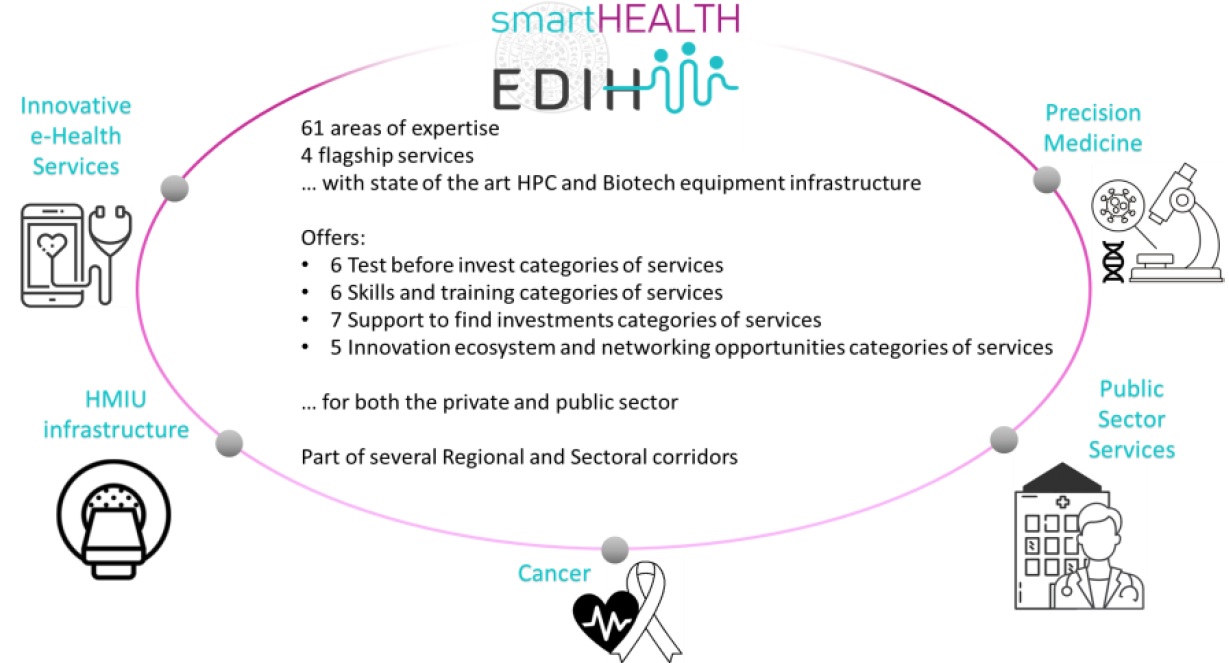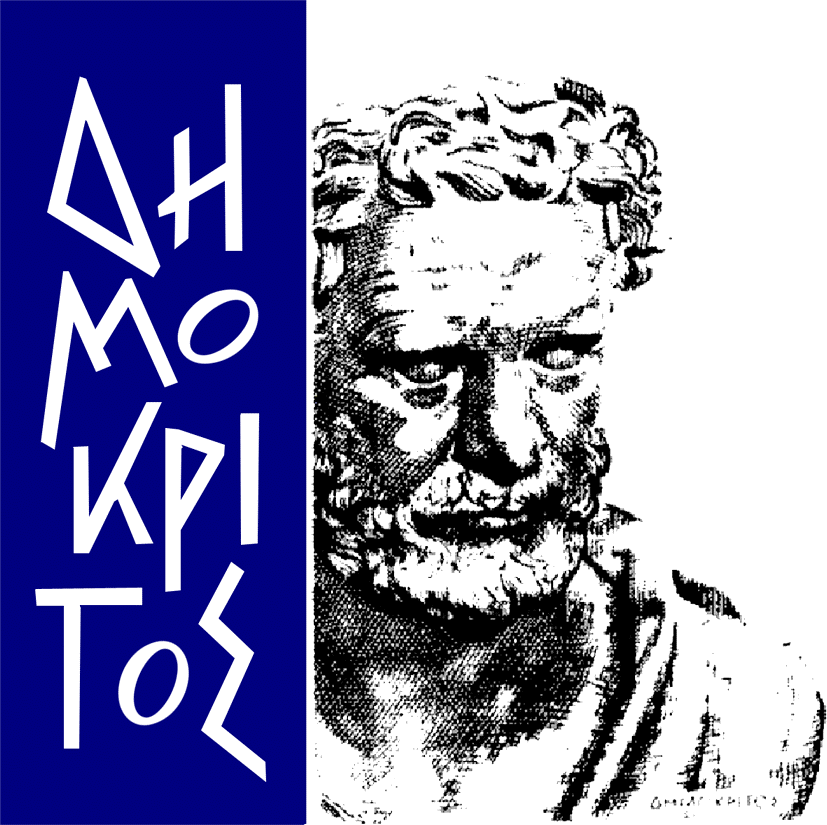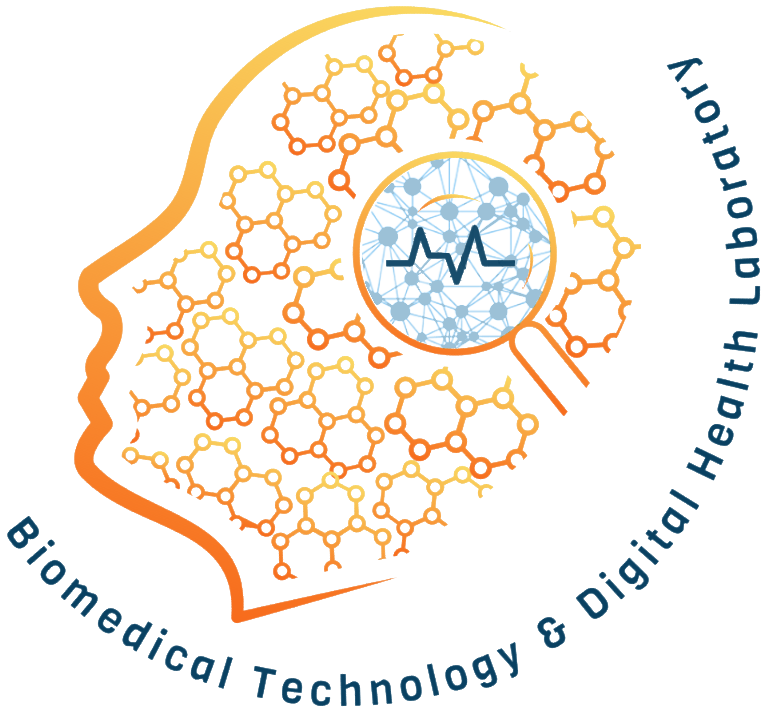smartHEALTH
European Digital Innovation Hub for Smart Health : Precision Medicine and Innovative E-health Services
Objective
smartHEALTH focuses on enhancing competitiveness through the utilisation of state-of-the-art research, development and implementation in digital health combining the complementary expertise of the partners and their cutting-edge research activities and available infrastructure. It will utilize internationally leading expertise in the areas of Artificial Intelligence (AI), Cybersecurity and High-Performance Computing (HPC), amongst others, to facilitate the development of innovative products and services for diagnostic imaging, precision medicine and bioinformatics. smartHEALTH aims to offer added-value services to the wider healthcare ecosystem that consists of key players in the private & public sectors. It addresses the needs of companies in the sectors of health IT, medical and biomedical informatics, bioimaging, diagnostics and drug design, pharma industry, healthcare provider organizations (hospitals, medical & diagnostic centres, primary care, social and elderly care etc.), healthcare professional organizations, public health authorities, patient advocacy groups, regulatory organisations, insurance companies and others.

Partners
The Digital Image and Signal Processing Laboratory (DISPLAY, www.display.tuc.gr) is engaged in research on signal/image processing, analysis and data mining with applications in imaging systems, integrated automation and biomedical data analysis. Indicative research interests include applications of non-invasive body/brain disease diagnostics including time-varying functional connectivity networks, machine and deep learning systems, image registration and segmentation, geometric models of growth, interaction and exploratory analysis of biological and biomolecular signals, and video surveillance for monitoring and early detection. Particular expertise is expressed in approaches to stochastic pattern recognition, feature extraction by using graph theory, network estimation models and data fusion, with concepts of data transformation and stabilization to ensure normalization and generalization of machine and deep learning algorithms.
Uni Systems, a long-standing strategic ICT partner to financial institutions, public organizations, telecom operators, enterprises and institutions in the European region has been providing integrated solutions and value added services since 1964. Today, the Company invests substantially in its European perspective and demonstrates a proven track record of accomplishments in complex and mission critical IT projects in more than 25 countries through its subsidiaries in Belgium, Romania, Luxembourg, Italy, and Spain.

The Hellenic Federation of Enterprises of Peloponnese and Western Greece has completed 104 years of uninterrupted presence and substantial contribution fostering business development in the geographical areas of Peloponnese, Western Greece, Epirus and the Ionian Islands. The primary objectives are the protection and promotion of the financial, moral and professional interests of its members and the development of a spirit of solidarity and mutual support among them. It is the independent voice of businesses, representing a broad spectrum of the areas’ economic activity, including manufacturing and services. Thus, the Federation enables its members to meet with and hear decision makers, potential business partners and investors, both locally and internationally; facilitating the sharing of ideas, experiences and new business opportunities and providing its members with the connections they need to compete and prosper.

FORTH (est.1983) is the largest research centre in Greece with facilities, highly qualified personnel and a reputation as a top-level research foundation worldwide. It focuses on interdisciplinary research and innovation activities in Microelectronics, Lasers, Photonics, Materials Science, Molecular Biology, Genetics, Biotechnology, Computer Science, Bioinformatics, Robotics, Telecommunications, Applied and Computational Mathematics, Chemical Engineering and Humanities. FORTH is the only research organization that participates in all 4 of the flagship projects in Precision Medicine (Oncology, Cardiology, Neurodegenerative diseases (coordinator) and COVID-19). The Institutes and administrative Units that participate are:
- FORTH-ICS: With an excellent track record in conducting research, developing applications, products and services it plays a leading role internationally in the broader area of ICTs. It has developed specialized eHealth applications and services, which initially operated in the region of Crete as a pilot, and since 1998 deployed and operating in many healthcare organizations throughout Greece
- IMBB-FORTH: one of the most prominent life science research institutions in Greece, with an outstanding record of scientific achievements, state of the art infrastructure and a broad range of research and educational activities.
- The Institute of Biomedical Research, located in Ioannina, is focusing on high-quality scientific research and developing applications, products and services in Multi-scale Predictive modelling, Automated Diagnosis – Processing of Biomedical Signals/Images, Development of Wearable Devices, Decision Support Systems and Bioinformatics
- ICE-HT-FORTH: located in Patras, conducts research in chemical engineering sciences. It has been active in metabolic network activity analysis, with emphasis on the development and application of methodologies for metabolomics and metabolic flux analysis (fluxomics). It participates in the Expert Centre for Metabolomics, a consortium of European metabolomics laboratories in biomedical applications. It has undertaken the Technical Coordination of the ELIXIR-GR Node since Sep. 2020 and coordinates the computational metabolomics and protein interactions pilot study
- IESL-FORTH: With long experience in biophotonics and biomedical imaging research, pioneering contributions to laser technology, spectroscopy and spectral imaging, non-linear microscopy and in vivo preclinical and clinical optical imaging
- IACM-FORTH: Has vast experience related to HPC, multi-scale simulations, Statistical and Machine Learning-based Predictive Models, and synergistic approaches with data analytics
- PRAXI Network is an administrative unit of FORTH, created in 1991 by FORTH and SEV-Hellenic Federation of Enterprises. It offers added value innovation support services to over 300 SMEs per year, related to technology transfer, innovation management benchmarking, IPR management and access to national and EU funding.
- STEP-C (est.1993) providing incubation facilities and services to start-ups (over 60 since 2005) with new and emerging technologies.

The Athena Research and Innovation Center in Information, Communication and Knowledge Technologies (Athena RC) was founded in 2003 in three cities, Athens, Patras and Xanthi. It is the only research center in Greece that is exclusively focused on Digital Sciences and Technologies. Its structure includes three Institutes, on Language and Speech Processing, Industrial Systems, and Information Management Systems, respectively, and eight Units, on Technology Clusters, Space Programs, Robot Perception and Interaction, Environmental and Networking Technologies and Applications, Pharma-Informatics, Sustainable Development, Artificial Intelligence-Data Science-Algorithms, and Women’s Innovation and Entrepreneurship, respectively. The vision of Athena RC is to conduct outstanding research in Information and Communication Technologies, pursuing solutions to global challenges, addressing local needs, and producing novel and deep technological results with a broad impact on other sciences, industry, and society at large. In addition to research on core problems in digital technologies, interdisciplinarity is a fundamental characteristic of the activities of Athena RC, with particular emphasis (but no limitation) on computational elements of the fields of precision agriculture, agri-food, precision medicine, biology, biodiversity, earth observation, space science, engineering, mechanics, linguistics, archaeology, and the arts. Next to its research portfolio, Athena RC is also very strong in innovation and entrepreneurial activities, including the co-foundation of several successful spin-off companies.

University Of Crete
The University of Crete (UoC) is a public educational institution, established in 1973 accepting its first students in 1977-78. Currently around 20,000 undergraduate and 3,500 graduate students study in UoC through the Faculties of Philosophy, Education, Social Sciences, Sciences & Technology, and Medicine, taught by an outward looking academic staff committed to excellence in research and teaching. Postgraduate studies, research and research training in Crete benefits from an academic and technological environment of international standards, built up over the last 40 years, by Departments of UoC with the Institutes of the Foundation for Research and Technology-Hellas (FORTH), the Hellenic Centre for Marine Research (HCMR), the University General Hospital (PagNi), the Hellenic Mediterranean University and other institutions in Crete. These provide a critical mass of expertize in AHSS, STEM disciplines and Medicine, as well as access to excellent complementary facilities for research and research training in highly competitive fields.
UoC major research infrastructure and facilities includes, among else, the Research Center for the Humanities, the Social and Education Studies (https://keme.uoc.gr/index.php/en/), the Natural History Museum of Crete (https://www.nhmc.uoc.gr/en), Finokalia Atmospheric Observatory (https://finokalia.chemistry.uoc.gr/), Skinakas Observatory (https://skinakas. physics.uoc.gr/en/), state-of-the-art analytical chemistry infrastructure (mass spectrometry, ICP-MS, ion chromatography, Nuclear Magnetic Resonance, Raman Spectroscopy), Electron microscopy and bioimaging units and Animal House facilities. Besides, the Center of Infrastructure Technology Services Informatics & Communication (https://ict.uoc.gr/ index.php/en/) is a vital component of the foundation’s operations, being responsible for software applications, hardware support, telecommunications, multimedia services, network infrastructure, educational technologies, information security and digital harmonization.

The National Center for Scientific Research “Demokritos” (NCSR-D) is the largest self-governing research organization, under the supervision of the General Secretariat for Research and Technology of the Greek Government. NCSR-D consists of 5 multi-disciplinary institutes, 3 of which participate in this initiative.
The Institute of Informatics and Telecommunications (IIT) participates with its Artificial Intelligence laboratory SKEL and more specifically the Biomedical and Health Informatics Team (BioHIT), with a focus on machine learning, data mining and knowledge representation, applied to applied to biomedical and health data, and the Data Engineering Group (DEG), which focuses on AI for automatically optimizing operations over heterogeneous data and Big Data. SKEL is the core research unit of NCSR-D’s Digital Innovation Hub (DIH), “ahedd – Attica Hub for the Economy of Data and Devices” that aims at the development, orchestration and sustainment of an open digital innovation ecosystem. Ahedd provides commercial-ready solutions on big data management, artificial intelligence-empowered analytics and IoT. Ahedd is registered in the EC DIH catalogue and is also the only Greek BDVA silver-labelled i-space.
The Institute of Nuclear & Radiological Sciences and Technology, Energy & Safety (INRASTES) participates with the Molecular Diagnostics Laboratory (MDL) which is active in research in the field of Human Genetics and especially in the study of hereditary cancer predisposing syndromes.
The Institute of Biosciences & Applications (IBA) participates with the Laboratory of Cell Proliferation & Ageing (LCPA) focusing on the investigation of the mechanisms of ageing and longevity, the Designed Biomolecules Research Group which focuses on structure-based discovery of bioactive molecules and computational study of protein dynamics, the Protein Structure and Molecular Modelling Research Group focusing on structural studies of proteins with emphasis on protein linked to diseases.
The Innovation Office (IO) of NCSR-D supports the researchers in business development, tech transfer, fundraising, protecting IPR, commercializing licences and establishing high-technology spin-off companies and networking. It also supports the companies of Lefkippos, acting as an incubator and accelerator.

The Laboratory of Analytical Chemistry (LAC) of the Department of Chemistry of the National and Kapodistrian University of Athens (NKUA), established in 1968, has continuously demonstrated many years of excelence in the development and application of modern analytical methods and techniques in a multitude of research applications. LAC is active in the field of Analytical Chemistry and its applications in food, environment, health, clinical and biomedical chemistry and pharmaceuticals, natural products and industrial chemistry, and is a leading laboratory in environmental epidemiology. LAC has long lasting cooperations with public bodies (Ministry, PPC, EYDAP, EODY), companies and industries, as well as a very large number of academic and research institutions both in Greece and Europe, in the context of research program collaborations, service provision and education as well as in the context of the social responsibility of academic institutions The laboratory has an extensive Quality Control and Food Safety system installed.
The research activity of LAC extends to the development and application of analytical methodologies with emphasis to mass spectrometry, but it has the capacities to develop analytical methods for all areas of chemical analysis, including molecular methods. LAC develops chemometric methodologies based on statistical programming languages (R, Matlbab etc), whereas it has created technologies that are adopted worldwide by the scientific community (RRTI, DSFP etc). The infrastructure of the laboratory includes access to state-of-the-art equipment (3 Q-ToF with n-UPLC and MALDI imaging capabilities, NMR with MAS and cryoprobe capabilities, 3 triple quadrupoles, m-Raman, ICP-MS, gas and liquid chromatographs, etc.). Besides classical chemical analysis LAC is active in the fields of metabolomics and lipidomics, and recently in proteomics. LAC consists of two individual laboratories, which function complementary to each other, the Service Delivery Laboratory and the Research Laboratory. The director of both laboratories and head of the laboratory’s research “Trace Analysis and Mass Spectrometry-group (TraMS)” is Professor of Analytical Chemistry Nikolaos Thomaidis.


